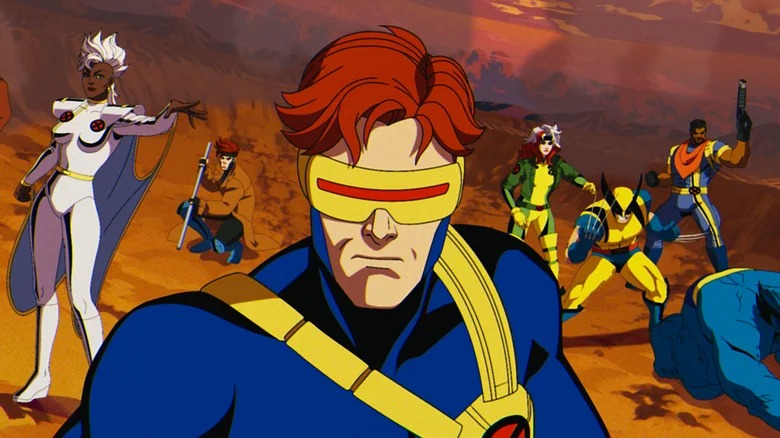The Essential Aspect Of The Comics That X-Men '97 Had To Get Right [Exclusive]

BY DEVIN MEENAN/MARCH 23, 2024 12:00 PM EST
The X-Men are back on TV and "X-Men '97" wants you to feel like they never left. The animation is different, but many of the original "X-Men" voice actors are back and the story picks up mere months after the O.G. series finale "Graduation Day." (Need an "X-Men" refresher before "'97"? We've got you covered.) The creators of "X-Men '97" are fans passionate about getting it right and it shows.
/Film's Ethan Anderton spoke with "X-Men '97" supervising producer/head director Jake Castorena for an episode of the /Film Daily podcast. Castorena stressed that making the show feel compatible with the old series was a priority:
That series bible also contained what Castorena and his colleagues defined as the ethos of the X-Men for the stories they'll be telling:
Indeed, what sets the X-Men apart from the Avengers is that they're mutants; people born with powers who compromise a minority group, which in turn allegorizes real minorities.
In X-Men, prejudice is the real supervillain
The X-Men were created by Stan Lee and Jack Kirby in 1963, the year before the Civil Rights Act was signed into law and a lasting blow was struck against the racism built into America. As more and more voices have made themselves heard in our society, the X-Men's mutant allegory has largely shifted to one of queerness (helped by queer fans who read such themes into the comics).
The 1982 graphic novel "X-Men: God Loves, Man Kills" (by Chris Claremont and Brent Eric Anderson) was a critique of Reagan-era televangelism so pointed that the "X-Men" movies had to tone it down. Castorena continued:
Indeed, even the opening titles of the original series don't hide these ideas; Jubilee is chased by an angry mob but finds herself trapped behind a chain link fence. That's why internet reactionaries lambasting "X-Men '97" as "woke" are so ridiculous; the progressive themes were always there. It's not impossible to like a piece of art and disagree with its politics, of course, but denying such themes are there when they're as blatant as they are in "X-Men" is absurd.
X-Men vs the Sentinels
Some context from the original "X-Men." The villains of season 1 were the Sentinels, mutant-hunting robots built by fearful racists. The series kicked off with the two-parter "Night of the Sentinels" and the season 1 finale, "The Final Decision," featured the X-Men destroying Master Mold, the central Sentinel AI. By season 2, the Sentinel program had been shut down. So, in their place, the hate group The Friends of Humanity sprung up; if the government wouldn't persecute mutants, vigilantes would.
"X-Men '97" opens with the X-Men fighting the Friends of Humanity, who have gotten their hands on salvaged Sentinel tech. Episode 1 concludes with the X-Men tracking a new Sentinel factory to the Sahara and once again destroying the robots. It's telling that the Sentinels have now served as introductory villains twice over. There's a pragmatic reason; they're a legion of robots with programming instead of personality. So, the focus can be solely on establishing the X-Men themselves. "X-Men" producer Will Meugniot feels the first pilot, "Pryde of the X-Men," failed because it used the Brotherhood of Mutants as villains instead of the Sentinels, making the story too stuffed.
The first two episodes of "X-Men '97" are now streaming on Disney+.